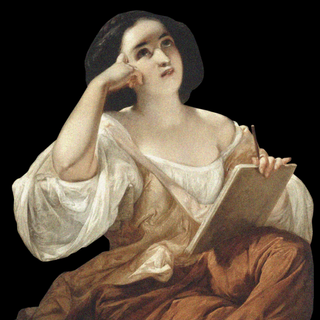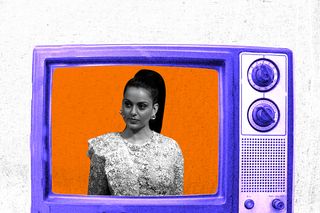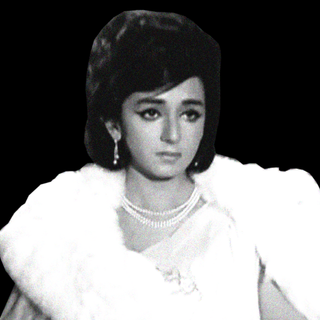
Kangana Ranaut’s New Reality Show Marks an Insidious Shift in the TV Genre
In a political climate as polarized and fraught as today, “Lock Upp” marks a distinct shift in the role and function of reality TV.

Something wicked this way comes. It’s in the form of a reality show called Lock Upp, in which “controversial” celebrities will suffer hostile, jail-like conditions and brave taunts from the actor turned right-wing ideologue host, Kangana Ranaut.
The showstopper, as it were, is the presence of comedian Munawar Faruqui. Faruqui is a stand-up comedian who was previously charged with hurting religious sentiments for a joke he didn’t crack. Since then, his career has faced several setbacks in the form of canceled shows and targeted harassment from Hindutva reactionary forces. In the promos for the show, Kangana Ranaut is seen training her weapons-grade bigotry against Faruqui, saying that he deserves a “saza-e-maut” on the show — that is, a death sentence.
A reality show with the premise of “locking up” individuals for controversial “crimes” is tone-deaf at best, and dangerous at worst. It marks a shift in reality TV in India. In a political climate as polarized, hateful, and fraught as the one we find ourselves in today, the presence of a show like Lock Upp marks a distinct change in the role and function of reality TV. Where previously they were instruments of voyeurism, cheap thrills, and placid distraction from politics, they are now toxic not just for the rife misogyny and ugly drama but also for what they represent.
Previously known for benign staples like Kaun Banega Crorepati, and cultural equivalents of junk food like Bigg Boss and Roadies, reality television in India has thus far managed to stay safely in the confines of ahistorical family entertainment.
Many would argue, however, that reality shows are far from harmless. “Another dimension to their popularity is how game shows tacitly become an exercise in nationalism-building. They pander to the masses, often setting the government’s agenda to amplify culturally ingrained biases,” writes Saumya Kalia for The Swaddle, on Indian game shows. Arguably, their decline in the TV diet is because they didn’t go far enough.
Enter Lock Upp. It promises to be a grotesque mishmash of the trashiness of Bigg Boss and Roadies, with the recent political charge of game shows like Kaun Banega Crorepati dialed up to a thousand. While television has often capitalized on the tired sentiment of unity amid differences of opinions, Lock Upp does the opposite — it pits two figures who have come to symbolize opposite ends of the political spectrum against one another in a hostile environment.
Far more insidious than apolitical TV, or trite, feel-good TV about opposing ideologies getting along, this particular show threatens to add fuel to a raging fire that has already engulfed political discourse in India.
Related on The Swaddle:
What Is Comedy’s Purpose in a Country Like India?
Faruqui himself has faced criticism for his participation in this show — some called it an exercise of humiliation that would trivialize the ruling government’s penchant for unjust incarcerations. Be that as it may, it is not his participation but the existence of the show itself that deserves far greater scrutiny. It was arguably tailor-made for the express purpose of letting Kangana Ranaut loose on people who are forced to receive her venomous tirades in a friendly spirit. For a person who has been banned from Twitter for genocidal remarks, a platform that gives her free reign to sound off on people like Faruqui represents an uneven power balance between the two.
Moreover, the show distorts the convention of this genre; reality TV is not about high-voltage drama powered by filthy language, but high-voltage drama powered by filthy rhetoric. The latter is a far more dangerous, far more insidious turn that would change the course of entertainment irreversibly. It signifies that it is no longer enough to revel in the pettiness and insecurities of human beings from a distance; now, nothing short of dangerous liaisons between politics and entertainment will suffice.
Which is to say, the socio-cultural context matters. TV doesn’t exist in a vacuum, and reality TV is certainly not kosher on its own. Even without the increased ugliness of the spectacle, reality TV hinges on extracting the most unpleasant interpersonal conflicts out of the most aggressively competitive people. It ends up making a spectacle out of the depths of shallowness. A 2014 study found that reality TV had the effect of increasing aggression in viewers. “This is one form of media that may appear harmless, but I think our research provides a little bit of evidence that there can be some negative outcomes as well,” one of the study’s researchers told NPR. Another study, published in Frontiers, showed how dating reality shows perpetuate sexist attitudes towards women. Think Splitsvilla, the Indian counterpart to Love Island and the Bachelorverse that the study looked at.
In other words, TV profiting off abusive behavior is not new. It’s not necessarily all bad — shows like Queer Eye and Ru Paul’s Drag Race have become cultural staples in celebrating queerness. But more often than not, it is the most caustic, reprehensible of personalities that often become reality stars who leverage their clout beyond just entertainment. The ascension of Donald Trump to the U.S, Presidency is a case in point: reality TV makes for powerful social and cultural clout. It is a vehicle to gain cultural mileage and a get-out-of-jail-free card for inexcusable behavior.
“Reality TV is part of the atmosphere. It is an entertainment genre and lifestyle, career path and political philosophy,” the New York Times noted. Giving someone like Kangana Ranaut that path — indeed, paving it just for her — not only adds more poison to an ever-hungrier zeitgeist. It also does so at Faruqui’s expense at a time when Islamophobia is driving young girls out of education and threatens to disenfranchise millions.
Rohitha Naraharisetty is a Senior Associate Editor at The Swaddle. She writes about the intersection of gender, caste, social movements, and pop culture. She can be found on Instagram at @rohitha_97 or on Twitter at @romimacaronii.
Related


Woe Is Me! “I Feel Like a Fraud. How Do I Stop This Self‑Confidence Spiral?”
